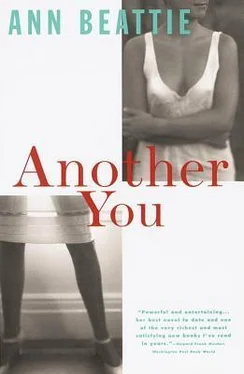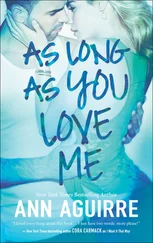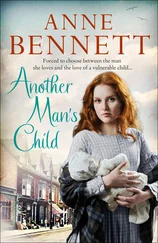Ann Beattie - Another You
Здесь есть возможность читать онлайн «Ann Beattie - Another You» весь текст электронной книги совершенно бесплатно (целиком полную версию без сокращений). В некоторых случаях можно слушать аудио, скачать через торрент в формате fb2 и присутствует краткое содержание. Год выпуска: 2014, Издательство: Vintage Books, Жанр: Современная проза, на английском языке. Описание произведения, (предисловие) а так же отзывы посетителей доступны на портале библиотеки ЛибКат.
- Название:Another You
- Автор:
- Издательство:Vintage Books
- Жанр:
- Год:2014
- ISBN:нет данных
- Рейтинг книги:5 / 5. Голосов: 1
-
Избранное:Добавить в избранное
- Отзывы:
-
Ваша оценка:
- 100
- 1
- 2
- 3
- 4
- 5
Another You: краткое содержание, описание и аннотация
Предлагаем к чтению аннотацию, описание, краткое содержание или предисловие (зависит от того, что написал сам автор книги «Another You»). Если вы не нашли необходимую информацию о книге — напишите в комментариях, мы постараемся отыскать её.
Another You — читать онлайн бесплатно полную книгу (весь текст) целиком
Ниже представлен текст книги, разбитый по страницам. Система сохранения места последней прочитанной страницы, позволяет с удобством читать онлайн бесплатно книгу «Another You», без необходимости каждый раз заново искать на чём Вы остановились. Поставьте закладку, и сможете в любой момент перейти на страницу, на которой закончили чтение.
Интервал:
Закладка:
21
DRIVING INTO KEY WEST he passed what seemed like endless shopping malls, filled with building-supply stores, open-air nurseries, discount liquor stores, stores selling aloe products. In spite of the state of the economy, the building boom was still on in Key West. Its advantage to Gordon was that it had allowed him to move off a distant key onto Key West itself, which Beth had been lobbying for since she’d married Gordon on a sailboat at sunset five years before.
The previous night, after talking to Janet Lanier, Marshall had called from the seafood restaurant. Beth had answered the phone after so many rings he’d been about to give up. A party roared in the background: the Byrds, he had decided, as the music overwhelmed Beth’s voice. The best he could make out was that Gordon and some friends had gone on a late-night sail. She urged him to come immediately, while there was still seafood pizza. He heard people yelling, splashing in the pool. “What will you give me.…” he heard. It was the Byrds.
He told a white lie. Told her he’d run out of steam, was stopping to spend the night at a motel he’d just checked into; he’d be in Key West before noon the next day. It sounded as if a tractor had toppled into the pool. “Oh God!” Beth said, the rest of her sentence drowned out by women shrieking and music overlaying the Byrds — live music, he guessed. He wondered who the neighbors were.
Gordon’s first wife, Caroline, had left him after five years, taking their daughter with her, moving to Mexico. Gordon had heard, from Caroline’s cousin Rawlins, who passed through Key West and went into the shop Gordon worked in, that Caroline had remarried another American while she was in medical school in Mexico, and that they’d gone to Rome to join a group of American and French doctors. When Caroline left the United States, Gordon decided to, as he put it, “cut my losses” and not have further contact with Caroline or with Julia. Caroline had been bitterly opposed to his having a relationship with his daughter. She had done everything she could to thwart him, but leaving the country had finally been successful.
Gordon’s second wife stayed married to him for about two years. She had a teenage son when they married, but the boy was in military school and visited infrequently, usually for a week or so during summer vacation. They’d lived in Fort Lauderdale then, and Gordon had been a late-night weekend disc jockey for the local radio station, as well as assistant manager of the bar Lissa worked in. Sonja had asked Lissa, when she married Gordon, what the boy’s interests were. She wanted to send him birthday presents. She was very thoughtful about that sort of thing. The answer, as best Marshall remembered, had been pornographic magazines and fencing, which had pretty much stymied Sonja in her pursuit of appropriate gifts. That marriage had also ended badly, with Lissa getting a quickie divorce and marrying a much older man. About that time, Gordon had started to work for the dive shop he’d stayed at until he started living with Beth. Then he’d gone into partnership with another person, borrowing money from Evie, which had slightly shocked Sonja, along with five thousand dollars from Marshall and Sonja after a desperate late-night phone call, which he’d paid back after a year, with interest. Sonja had returned the interest part of the check, and Gordon — whether he’d been sincere or meant to be funny — had sent a “thank-you” gift of a pitcher shaped like a parrot, a set of glass swizzle sticks topped with pineapples, cherries, and bananas, and a box of instant margarita mix. As far as Marshall knew, Gordon had lived alone in between Lissa and Beth. He’d married Lissa in a large wedding in her hometown of Memphis, wearing a rented tuxedo to accompany his bride, in an ornate white bridal dress she’d told Sonja her mother had kept on a dress form in her sewing room from the day Lissa turned sixteen. For her first marriage, Lissa had eloped, but her mother had never gotten rid of the dress. Once a week — this was true years after the second marriage and was probably still the routine — Lissa’s mother set her hairdryer on “cool” and blew air on the dress to remove any dust. The curtains were kept pulled in the room so the dress wouldn’t yellow. Sonja had related this to him with amazement, late one night in bed. He and Sonja and Evie had gone to the wedding, flying out of Boston and staying at the Peabody Hotel, which was famous for having a flock of ducks that got off the elevator and marched into the lobby to swim in the fountain twice a day. The day before the wedding, Sonja and Evie had gone to Graceland and bought plastic place mats depicting Elvis in his various jumpsuits, smiling. He could remember the place mats propped up on the window ledge, Sonja shaking her head at them as she sprawled on the big bed: all those views of dead Elvis in his sparkle suits.
He had only met Beth twice: soon after her wedding, and a year later, when she flew to New Hampshire with Gordon to attend Evie’s birthday party. She was now in her early forties, a short, slim woman with streaked blond hair and inch-long red fingernails who seemed to him a mixture of simultaneous shyness and extroversion. She had blushed and mumbled when anything resembling a personal question was asked of her, but she’d also brought a big suitcase filled with Mary Kay cosmetics, which she sold, and had insisted the women who had come for coffee and birthday cake stand under falling mists of various fragrances to see which most suited them. Evie’s birthday present had been a bottle of perfumed lotion and a small pink kit containing blush, eyeshadow, and lipstick. Evie wore no makeup. She gave it to Sonja after Beth left.
He passed the dive shop on Route 1 where Gordon used to work, recognizing it from the time he’d been in Key West years before, with Sonja. The dive shop was his landmark; Marshall set his odometer and began to look for the other markers Gordon had given him. In five minutes, he’d pulled onto Simonton and found the house: a white frame house with a new roof and rotten boards and broken shutters piled in the front lawn next to a banyan tree whose trunk took up half the front yard. Two long, splintered window boxes sat at curb-side, along with a recycling container loaded with beer cans and upside-down liquor bottles. One window box was empty, an end broken off. The other held one yellowish hemp plant. The brackets were on the back, rust bleeding through white paint. One high-heeled shoe lay on its side in a puddle. The front door was ajar. A rooster, bobbing out from behind water-soaked cardboard boxes thrown under a dead palm, crowed piercingly as Marshall approached the gate, surprising him so he jumped back, grabbed the sunglasses he’d just removed so hard he feared he’d broken the arm. He hadn’t. He blew on his glasses, cleaned them on his shirttail. Back on his nose, they were only slightly less smeared.
People on mopeds sped by. A truck carrying lumber, with a white handkerchief dangling from an end of a board, crept along behind the mopeds. Behind that came an elderly man pedalling a bicycle. He wore blowsy swim trunks, a white Isadora Duncan scarf dangling down his bare chest, and green clogs. A small brown dog hung its head out of the bike basket fastened to the front; behind him, he pulled a slightly larger dog in a basket on wheels. That dog also wore a scarf. A bandanna. What difference did it make? He moved backward to lean against the hood of his car and look at the house. A new window had just been set in beside the front door; plywood covered a hole to the left of the door. A wicker chair and a chair with several broken brown and beige plastic straps sat on the front porch, where a work table was also set up. A palm grew out of a plastic garbage can, pushed up against the plywood window. Above the door was a curved window of etched cranberry glass. From inside, music that sounded like the vocal equivalent of a whirling dervish floated out, though it was nowhere near as loud as the music from the night before. The neighbors, he saw, were a small bodega and, on the other side, a boarded-up house with a rotting boat in the front yard. Several cats watched him from the bow of the boat. A hula hoop was draped over one arm of a lamppost twined with faded red tinsel. A stocky man wearing a leather cap, leather jeans, and leather vest walked by, his chains jingling. Marshall looked back at the house. Three roosters followed their mother out Beth and Gordon’s gate, heading for the next yard. This was the neighborhood Beth preferred to the cluster of contemporary houses on the channel on Duck Key? The singer’s voice soared, repeating the same phrase over and over as he went up the walkway, trying to avoid tripping on scattered bricks and heaved-up cement. The first step was two thicknesses of board; the other steps were cinder block.
Читать дальшеИнтервал:
Закладка:
Похожие книги на «Another You»
Представляем Вашему вниманию похожие книги на «Another You» списком для выбора. Мы отобрали схожую по названию и смыслу литературу в надежде предоставить читателям больше вариантов отыскать новые, интересные, ещё непрочитанные произведения.
Обсуждение, отзывы о книге «Another You» и просто собственные мнения читателей. Оставьте ваши комментарии, напишите, что Вы думаете о произведении, его смысле или главных героях. Укажите что конкретно понравилось, а что нет, и почему Вы так считаете.












